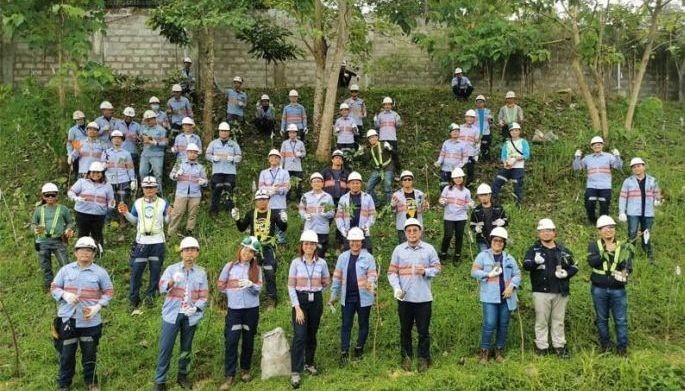MANILA, Philippines — Aboitiz Power Corporation subsidiary Therma Visayas Inc. (TVI) marked the seventh year of its Carbon Sink Management Program with 770,000 trees planted en route to achieving a 10-year one million trees target through 2027.
“One million trees. That is the target and we now have greater momentum at 77% on the program's seventh year,” said TVI Vice President and Facility Head Noel Cabahug. “We have done a lot but we are determined to do more.”
Established in 2016, the Carbon Sink Management Program aims to create a sustainable carbon sink of one million trees by partnering with farmers across Cebu. A carbon sink is anything that absorbs more carbon than it releases, helping lower the amount of carbon dioxide from the atmosphere.
"Our partner farmers and Ramon Aboitiz Foundation (RAFI) have seen to the planting and the nurturing of the native tree seedlings in this effort to mitigate carbon emissions," Cabahug added. “We intend to continue nurturing, not just the program, but also our camaraderie with our partners.”
TVI has teamed up with some 277 tree farm partners for seedling production, planting and maintenance activities of the native trees. Meanwhile, RAFI provided technical expertise via their foresters to ensure the sustainability of the carbon sink.
Under the program, partner farmers earn a livelihood from payments for their seedlings and maintenance services, as well as added income opportunities from the produce of fruit-bearing and high-value trees.
Native trees of mixed fruit and timber planted since 2017 include Narra, Lanutan, Kakaw, Coffee, Lomboy, Nangka, Guyabano, Rambutan, Lanzones, Avocado, Kunawom, Tugas/Molave, Duhat, Labana, Lemonsito/Kalamansi, Malaruhat, Sangil, Agoho del Monte, Caimito, Conalum, and Taguilomboy.
The total land area covered as of end 2022 is 937.5 hectares spanning the municipalities and cities of Balamban, Toledo, Borbon, Asturias, Barili, Tuburan, Pinamungahan, Ronda, Cebu, and Dumanjug.
According to a study published in “The Journal of the Association of Tropical Biology and Conservation in 2016,” secondary forests have a high potential for biodiversity and carbon sequestration co-benefits.
This would entail a prolific ecology in the area and an effective strategy for forest management and restoration which is integral in the rural communities.
"It is highly encouraging. In line with the mitigation model of the Carbon Sink Management Program, having plant diversity yields a higher percentage of carbon and other greenhouse emission sequestration," Cabahug said.
Operating a state-of-the-art power plant certified in five ISO standards—Quality Management, Occupational Health and Safety, Environmental Management, Asset Management, and Business Continuity Management—TVI is focused on creating a positive impact in its host communities beyond the generation of reliable and stable electricity.
Its 340-megawatt baseload power plant in Barangay Bato, Toledo City plays a primary role in providing electricity to the region, supporting Cebu's rapid economic growth.


